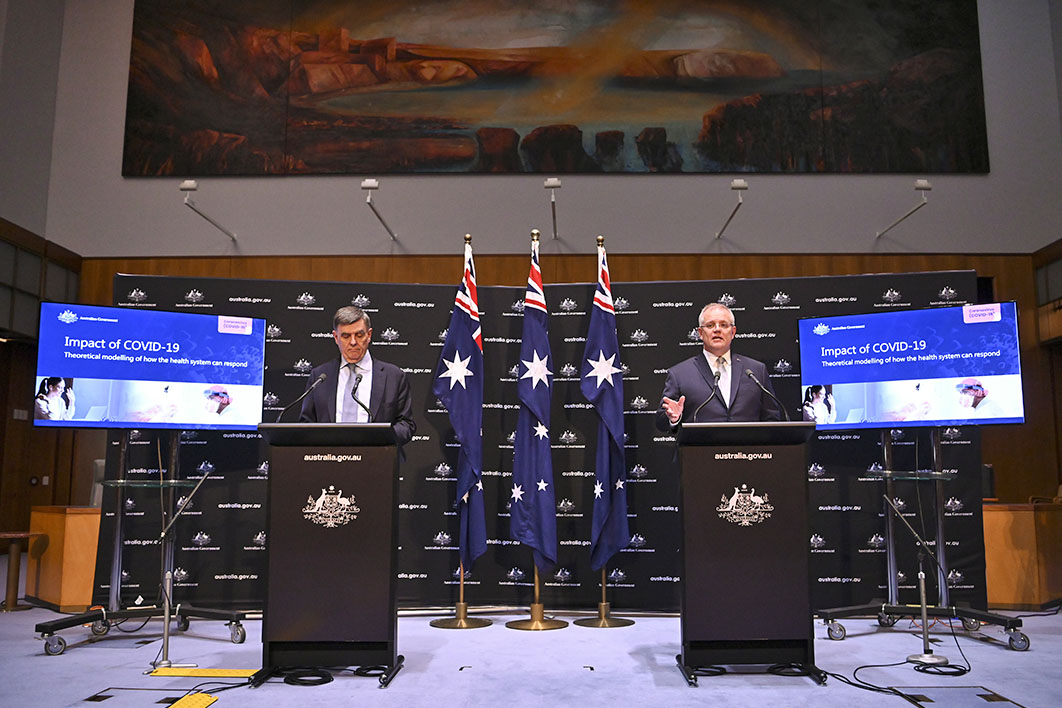The calls continue for our senior politicians and health advisers to lay all their cards on the table. Liberate the data and the projections, bring all twenty-five million of us into the tent, and let the national discussion begin.
In the Guardian, Richard Denniss thoughtfully describes the invidious choices we face and urges us all to “be open and honest about the role of evidence, the role of democracy, and the limits of both”:
Until a vaccine is invented, we are going to need to have a very hard, very important conversation about how much risk to accept from Covid-19. The science will not be crystal clear, there will be differing views from well-informed people and hard choices will need to be made, often in real time, regardless of how uncertain the consequences of those choices are. Hopefully, when debating these questions, we can treat the scientists with respect and cut our politicians a little slack.
“Risk.” See what he did there? He meant “deaths” but it seems couldn’t, in a crafted opinion piece, bring himself to say it. How’s the frank and fearless discussion going so far?
Epidemiologist Tony Blakely also recommends full release of all modelling and options, suggesting, bizarrely, “citizen participation in deliberations, through mechanisms ranging from talkback radio to citizen juries”:
We need to also hear from a wide range of experts to help us deliberate. Philosophers, ethicists, economists, public health experts and epidemiologists — to name just a few.
At the end of this deliberation process, it will necessarily return to the politicians to “make the call.” But they need some sense of societal consent.
What would this “societal consent” look like? How would it be measured? By referendum? Opinion poll? Even if it could be determined, it would chop and change as the weeks dragged on into months.
We have “societal consent” right now. We are following the directions of our elected governments and their health advisers, although there is a danger our cooperation will fray the longer this goes on.
Calls for national “conversations” about anything usually don’t stand close inspection. What do advocates envisage, the country as a town hall, with a moderator and rules? At the moment, there’s almost nothing but the coronavirus being written or talked about in the public sphere. Everyone has an opinion. Isn’t this a conversation?
Ah, comes the response, we can’t have a proper conversation without knowing everything the national cabinet knows.
What might that look like? I suspect that if you dropped truth serum into Scott Morrison’s and Brendan Murphy’s coffee they’d admit they don’t have a hard and fast plan, that they are trying to navigate a middle road between general economic and social wellbeing and minimising fatalities. That’s not a criticism — this is a lot like public policy on issues like road-speed limits and alcohol laws, writ enormous. Most importantly, it’s still early days and they’re waiting and seeing.
The vital figure in the equation is our (now heightened) intensive care capacity. Under no circumstances can the authorities risk overloading that. But between where we are now and that speed limit is a fair amount of leeway. Maybe they’ll twiddle the restrictions knob to let the health system take pressure off the economy and society (yes, that means extra fatalities) while they test and trace. Perhaps New Zealand will soon provide clues as to the feasibility of elimination. The longer they wait, the more likely a cure (if not, for a while, a vaccine) arrives.
Murphy let slip at a recent press conference that aiming for some level of immunity is desirable, but when pressed didn’t elaborate. Can you blame him? Who wants to be seen casually discussing the sacrifice of lives for the greater good? Morrison’s “six months,” meanwhile, is there to give us light at the end of the tunnel. Of course they don’t know what things will be like in September. They don’t know how we get out of this.
Should the government come totally clean? Should the prime minister, premiers and chief ministers announce, “It’s over to you, talkback radio and citizen juries”? How catastrophic would that be for our faith in democracy and the experts?
How brutally honest should our authorities be with us? Like describing the coronavirus strategy itself, there seems to be no precise answer, let alone one that will necessarily apply this time next week. •





